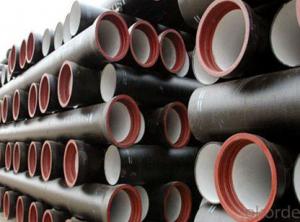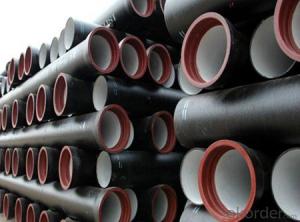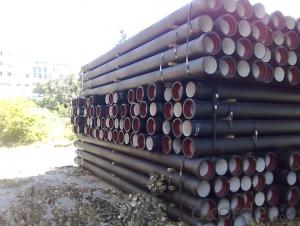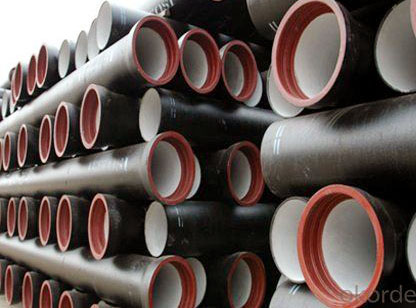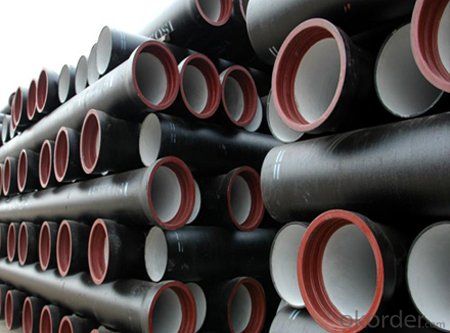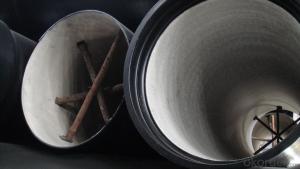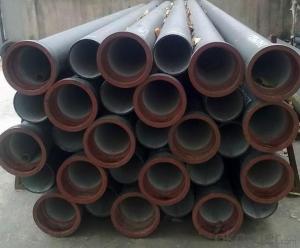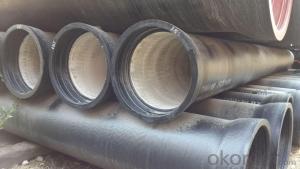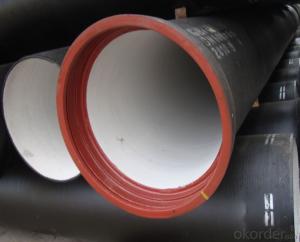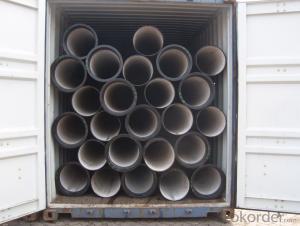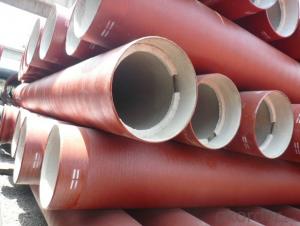New Ductile Iron Pipes of China DN200 EN598
- Loading Port:
- China main port
- Payment Terms:
- TT or LC
- Min Order Qty:
- 24 m.t.
- Supply Capability:
- 300000 m.t./month
OKorder Service Pledge
OKorder Financial Service
You Might Also Like
1. Ductile Iron Pipe Description :
2) Pipe ends: Spigot and socket ends, with 100% SBR rubber gaskets accoding to ISO4633
3) we can do third party inspection according to customer's request.
4) Our products have been sold to many international market, such as Middle East and South East Asia and Africa.
2. Main Features of the Ductile Iron Pipe:
Material: Ductile iron grade 500-7/ 450-10 in accordance with ISO1083
Test: In accordance with ISO 2531 / EN 545 / EN598 and 100% water pressure test
Rubber: NBR, SBR, EPDM according to ISO4633 / EN681.1
Note: The gaskets, bolts & nuts are supplied respectively as your special requirement
Standard: ISO 2531, EN545, EN598, ANSI, AWWA
Certificate: ISO9001, ISO14001, SGS, NSF, WRAS
Length: 6m or cut into 5.6m, 5.7m, 5.8m
Internal Lining: Cement, conform to ISO4179
3. Ductile Iron Pipe Images:
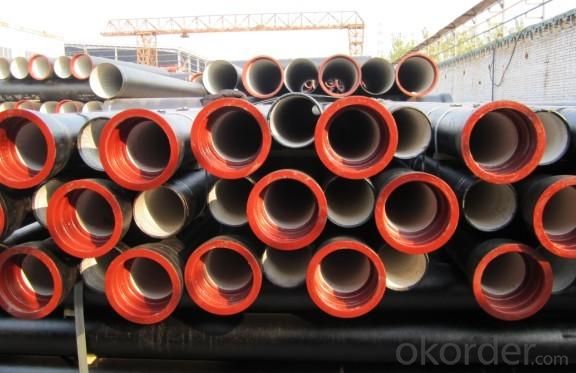
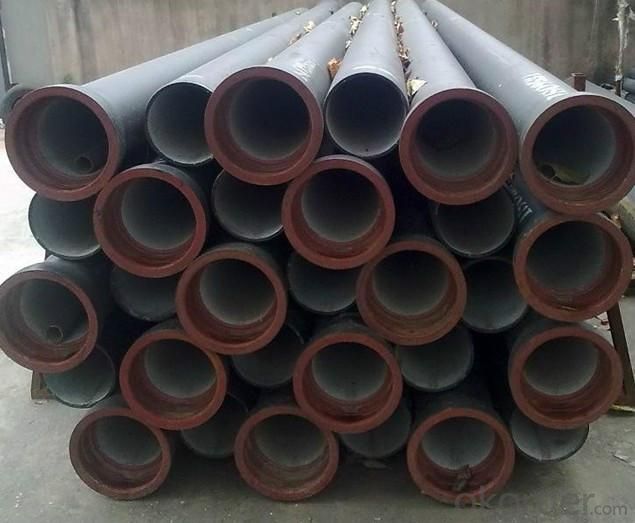
4. Ductile Iron Pipe Specification
Shape: Round
Hardness: 230
Pipe Wall Thickness: standerd
Pull Strength: 420
Yield (≥ MPa): 300
Material: Ductile Iron
water ductile iron pipe: SO2531 / EN545 DI pipe
Additional Services: Internal Coating
Packaging: packed in bag, plastic bag, steel strip, steel wire,double wire, iron box, wooden box, tarpaulin, plastic sheeting
Test: X-ray, UT, magnetic particle,inspection,hydrostatic test.
Processing service: Beveling, Threading, Slotting, Cut-to length, Bends, Quench and Temper, Fabrication, Double-jointing and On-site assistance
5.FAQ:
We have organized several common questions for our clients,may help you sincerely:
1.Q: Why would you choose ductile iron pipe rather than other pipe materials?
A:The reasons are obvious for that not only ductile iron pipe possesses the inherent strength and flexibility of ductile iron, combined with proven corrosion protection systems, but also the cost savings can be achieved from design to installation and commissioning.
2.Q:Why can you guarantee the inner of pipes can’t be corroded?
A: High alumina cement mortar lining and sulphate-resistant cement mortar lining. These two special linings are applicable to inner anti-corrosion for sewage pipes, improving resistance to erosion of the sewage components.
- Q: Can ductile iron pipes be used for underground fire hydrant systems?
- Yes, ductile iron pipes can be used for underground fire hydrant systems. Ductile iron pipes are known for their strength, durability, and resistance to corrosion, making them a suitable choice for underground installations. They can withstand the high pressure and flow rates required for fire hydrant systems, ensuring reliable water supply for firefighting purposes.
- Q: Can ductile iron pipe be used for horizontal directional drilling?
- Yes, ductile iron pipe can be used for horizontal directional drilling (HDD). HDD is a trenchless method of installing underground utilities, such as pipelines, without the need for traditional open-cut trenching methods. Ductile iron pipe is often used in HDD projects due to its strength, durability, and ability to withstand the stresses and strains associated with directional drilling. It has excellent resistance to external loads and can withstand the bending and pulling forces involved in HDD installations. However, it is important to consider factors such as pipe diameter, wall thickness, and soil conditions to ensure proper pipe selection for HDD projects. Additionally, proper installation techniques and precautions should be followed to ensure the long-term performance and integrity of the ductile iron pipe in HDD applications.
- Q: Are ductile iron pipes resistant to impact damage?
- Ductile iron pipes possess remarkable strength and durability, rendering them resistant to impact damage. Their exceptional toughness and flexibility are a result of their unique composition, which includes a higher percentage of carbon and silicon. Consequently, ductile iron pipes can withstand external forces and impacts, such as those caused by heavy construction equipment or accidental incidents during installation or maintenance activities. Moreover, these pipes exhibit a high resistance to cracking and fracturing, thereby further enhancing their ability to endure impact damage. However, it should be noted that although ductile iron pipes are highly resistant to impact damage, they are not completely immune. Extreme or repeated impacts may still inflict damage, albeit to a lesser extent compared to other pipe types. Regular inspections and maintenance are crucial to detecting and addressing any potential impact damage to ensure the long-term integrity and performance of ductile iron pipes.
- Q: Can ductile iron pipe be used for high-pressure gas systems?
- Ductile iron pipe is a viable option for high-pressure gas systems due to its remarkable strength and durability. Its ability to withstand high pressures makes it suitable for applications requiring such systems. It possesses outstanding mechanical properties, including high tensile strength, yield strength, and impact resistance. These properties enable it to endure the pressures associated with gas transmission. Additionally, its resistance to corrosion ensures its reliability for long-term use in high-pressure gas systems. However, to ensure optimal safety and performance, it is crucial to consider the specific requirements and regulations of the gas system and seek guidance from industry professionals for correct installation and maintenance of the ductile iron pipe.
- Q: Are ductile iron pipes resistant to chemicals or solvents?
- Ductile iron pipes possess a general resistance to a wide variety of chemicals and solvents. This resistance can be attributed to their composition, which consists of a high percentage of iron and carbon, as well as small amounts of other alloying elements like silicon, manganese, and magnesium. These alloying elements contribute to the overall strength and durability of the pipes, thereby making them highly resistant to corrosion and chemical attacks. However, it is important to acknowledge that the resistance of ductile iron pipes to chemicals and solvents may vary depending on the specific substance and its concentration. Certain aggressive chemicals or solvents, especially those with high levels of acidity or alkalinity, may gradually corrode or degrade the material of the pipes over time. In such instances, it is advisable to consult the pipe manufacturer or a professional engineer to ensure the compatibility of the pipes with the specific chemicals or solvents being used. Furthermore, the proper installation and maintenance practices are critical factors in preserving the chemical resistance of ductile iron pipes. Regular inspections, cleanings, and the application of protective coatings can assist in extending the lifespan and performance of the pipes when exposed to various chemicals or solvents.
- Q: What are the different pressure classes available for ductile iron pipes?
- There are several pressure classes available for ductile iron pipes, which are typically used for water and wastewater applications. The most common pressure classes for ductile iron pipes include Class 150, Class 200, Class 250, Class 300, and Class 350. These pressure classes indicate the maximum working pressure that the pipe can withstand in pounds per square inch (psi). Class 150 ductile iron pipes have a maximum working pressure of 150 psi, while Class 200 pipes can handle up to 200 psi. Class 250 pipes can withstand pressures up to 250 psi, and Class 300 pipes have a maximum working pressure of 300 psi. The highest pressure class, Class 350, can handle pressures up to 350 psi. The selection of the appropriate pressure class for a ductile iron pipe depends on various factors such as the system design, fluid characteristics, and operating conditions. It is important to consult the relevant standards and guidelines, such as the American Water Works Association (AWWA) standards, to determine the appropriate pressure class for a specific application. It is worth noting that these pressure classes refer to the working pressure of the pipe, which is the pressure the pipe is designed to safely contain during normal operation. The pipes are typically tested and certified to ensure they meet the required pressure class standards.
- Q: Can ductile iron pipes be used in areas with high soil acidity and alkalinity?
- Ductile iron pipes can generally be used in areas with high soil acidity and alkalinity. However, it is important to consider the specific conditions and take appropriate measures to mitigate the potential effects of these soil characteristics on the pipes. In areas with high soil acidity, the acidic conditions can promote corrosion of metal pipes, including ductile iron. To prevent this, protective measures such as applying an external coating or using cathodic protection can be implemented. These measures help to create a barrier between the pipe and the corrosive environment, extending the longevity of the pipes. Similarly, in areas with high soil alkalinity, the alkaline conditions can also have an impact on the performance of ductile iron pipes. Alkaline soils can cause the formation of calcium carbonate deposits, commonly known as scale, which can reduce the flow capacity of the pipes over time. Regular maintenance and cleaning of the pipes can help mitigate the effects of scale buildup. It is worth noting that the suitability of ductile iron pipes in areas with high soil acidity and alkalinity may also depend on the specific grade and quality of the pipes. Manufacturers often provide guidelines and recommendations regarding the use of their products in various environmental conditions. It is advisable to consult with pipe manufacturers or industry experts to ensure proper selection and installation of ductile iron pipes in such areas.
- Q: What is the expected deflection capability of ductile iron pipes?
- Compared to other pipe materials, ductile iron pipes typically have a high expected deflection capability. These pipes possess a flexible nature that enables them to withstand external loads and stresses without breaking or cracking. This flexibility allows the pipes to deflect under pressure, absorbing and evenly distributing the force along their length. Factors such as pipe diameter, wall thickness, and soil conditions can influence the specific deflection capability of ductile iron pipes. However, in general, these pipes can typically deflect up to 2% to 5% of their diameter without causing significant damage or compromising structural integrity. This deflection capability allows the pipes to adapt to ground movement, thermal expansion, and other external forces, making them highly resilient and reliable for various applications. It is important to consider the deflection capability of ductile iron pipes in conjunction with other design criteria, such as pipe burial depth, trench width, and backfill material. By following proper installation practices and adhering to industry standards and specifications, the expected deflection capability of ductile iron pipes can be optimized and maintained throughout their service life.
- Q: Can ductile iron pipes be used for fire protection systems?
- Yes, ductile iron pipes can be used for fire protection systems. Ductile iron is a type of cast iron that exhibits high strength and flexibility, making it suitable for a wide range of applications, including fire protection systems. It has excellent mechanical properties, including high tensile strength and impact resistance, which are important factors for withstanding the high pressures and stresses that can occur during fire suppression efforts. Ductile iron pipes are known for their durability and longevity, which is crucial for fire protection systems that need to be reliable and functional for extended periods of time. They have a longer lifespan compared to other materials, such as PVC or galvanized steel, and are less prone to corrosion, which is especially important for fire protection systems as they need to remain operational even after long periods of inactivity. Furthermore, ductile iron pipes have excellent fire resistance properties. They can withstand high temperatures without losing their structural integrity, ensuring that the fire protection system remains intact and functional during a fire emergency. This is crucial for ensuring the safety of occupants and minimizing property damage. In addition to their mechanical and fire-resistant properties, ductile iron pipes are also compatible with various types of fittings, valves, and accessories commonly used in fire protection systems. This allows for easy installation and integration into existing fire suppression networks. Overall, ductile iron pipes are a reliable and suitable choice for fire protection systems due to their high strength, durability, fire resistance, and compatibility with other system components.
- Q: How does ductile iron pipe perform in extreme weather conditions?
- Ductile iron pipes are known for their exceptional performance in extreme weather conditions. These pipes exhibit a high level of durability, resistance, and flexibility, making them suitable for withstanding harsh weather conditions such as extreme temperatures, heavy rain, snow, and even earthquakes. One of the key attributes of ductile iron is its ability to resist damage from freezing temperatures. Unlike other materials, ductile iron pipes have a low coefficient of thermal expansion, enabling them to withstand the expansion and contraction that occurs during freeze-thaw cycles without cracking or breaking. This ensures the pipes remain intact and continue to perform optimally even in frigid conditions. Additionally, ductile iron pipes have excellent corrosion resistance, making them highly resilient against the corrosive effects of extreme weather. They are protected by a durable zinc coating, which acts as a barrier against rust and other forms of corrosion. This coating, combined with the inherent strength of ductile iron, makes these pipes highly resistant to the corrosive effects of rain, snow, and moisture. Moreover, ductile iron pipes possess superior flexibility, allowing them to accommodate ground movement and seismic activity. In regions prone to earthquakes or shifting soil, these pipes can absorb the stress and strain without fracturing, ensuring continuous water supply and sewerage services even in the most challenging weather conditions. Overall, ductile iron pipes excel in extreme weather conditions due to their durability, resistance to freezing, corrosion, and flexibility. Their ability to withstand the elements ensures uninterrupted water supply and sewage systems, providing reliability and peace of mind to utilities and communities even in the harshest environments.
Send your message to us
New Ductile Iron Pipes of China DN200 EN598
- Loading Port:
- China main port
- Payment Terms:
- TT or LC
- Min Order Qty:
- 24 m.t.
- Supply Capability:
- 300000 m.t./month
OKorder Service Pledge
OKorder Financial Service
Similar products
Hot products
Hot Searches
Related keywords
